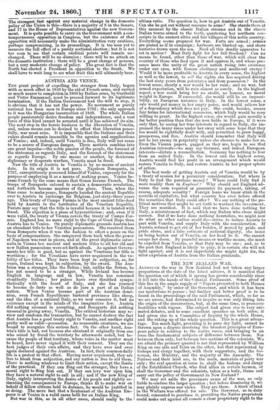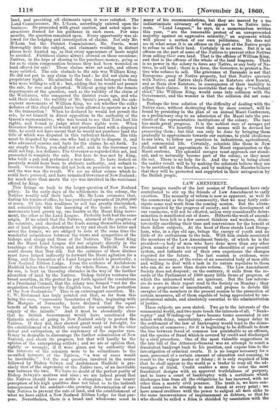THE NEW ZEALAND WAR.
ALTHOUGH the war in New Zealand had not taken any larger proportions at the date of the latest advices, it is manifest that the question out of which it sprung has grown considerably since it fell into the hands of the Colonial Parliament. Some proof of this lies in the ample supply of "Papers presented to both Houses of Assembly," by order of the Governor, and which it has been our misfortune to peruse ; but further and better proof is to be found in the proceedings of the said Parliament, which, so far as we are aware, had determined to inquire as was only fitting into the origin of the insurrection, but, at the same time, to prosecute hostilities with vigour. The subject had given rise to very ani- mated debates, and to some excellent speeches on both sides; it had given rise to a Committee of Inquiry by the whole House, and the raking up of the whole question. This is a great advan- tage. Too much light, providing it be pure dry light, cannot be thrown upon a dispute involving the broadest principles of Euro- pean policy in relation to the native races, and bringing to an issue the fundamental subjects of difference between them. Nor between them only, but between two sections of the colonists. We are afraid the primary quarrel is not that represented by William King on one side and Teira on the other, but that represented by bishops and clergy together, with their supporters, and the Go- vernor, the Ministry, and the majority of the Assembly. The Natives and their land are, in the main, materials of party war only; the real question at issue is, shall the bishops and clergy of the Established Church, who find allies in certain laymen, or shall the Governor and the colonists, taken as a body, frame and carry out the policy of Government in New Zealand ? We may set aside the proximate cause of the war, as only
i liable to confuse the larger question ; but before dismissing it, we
may plainly express our views. They are these. A block of land in the Waitara was offered for sale. The Governor, as in duty bound, consented to purchase it, providing the Native proprietors could make out against all comers a clear proprietary right to the
land, and providing all claimants upon it were satisfied. The Land Commissioner, Mr. L'Lean, accordingly entered upon the business. He proceeded with great caution, and acted upon in- structions framed for his guidance in such cases. For nine months, the question remained open. Every opportunity was al- lowed for the lodging and investigation of claims. Not only Mr. M'Lean but the District Commissioner, Mr. Parris, went thoroughly into the subject, and claimants residing in distant places were hunted up, so that every appearance of haste might be avoided. Fictitious claims always abound on these occasions; Natives, in the hope of sharing in the purchase-money, going so far as to claim compensation because they had been wounded on land offered for sale These claims were set aside, and others were satisfied. The sole obstacle to the sale was William King. He did not put in any claim to the laud ; he did not claim any proprietary right. He admitted that the land belonged to those who were willing to sell it ; but, adding that he would not permit the sale, he rose and departed. Without going into the remote departments of the question, such as the validity of the claim of the Waikatoes, who conquered the district years ago, and who sold their claim; the validity of Mr. Spain's award, and the sub- sequent movements of William King, we ask whether the sulky defiance of this chief should have been allowed to operate as a bar to the transaction ? When he declared he would not permit the sale, he set himself in direct opposition to the authority of the Queen's representative, who was bound to see that Teira had his rights, and bound to judge what those rights were. When Governor Browne said he would not purchase land with a disputed title, he could not have meant that he would not purchase land the title of which was disputed in this turbulent fashion. The title must be disputed by some one who had a right to dispute it, and who advanced reasons and facts for the claims he set forth. To say simply to Teira, you shall not sell, and to the Governor you shall not buy, is a defiance. The Governor so regarded this act, and proceeded to complete the sale. But here he was met by King, who built a pah and performed a war dance. To have looked on passively would have been to abdicate authority, and submit to insult. Governor Browne did not look on passively as we know ; and the war was the result. We see no other course which he could have pursued, and have remained Governor of New Zealand ; for much more than meets the eye was involved in the resistance offered by King. This brings us back to the larger question of New Zealand policy. In the early days of the settlements in the colony, the Natives readily sold their land. Mr. Mc Lean estimates that, during his tenure of office, he has purchased upwards of 20,000,000 of acres. Of late this readiness to sell has greatly diminished, and coincidently with the lessening of the desire to sell, two movements have grown up, one known as the Maori King move- ment, the other as the Land League. Probably both had the same origin. If we admit that the Natives, alarmed at the progress of the colonists, and shocked at the feuds among themselves arising out of land disputes, determined to try and cheek the latter and arrest the former, we are obliged to note at the same time the wonderful coincidence between the views and sympathies of the bishops and clergy and those of the Natives. The Maori King and the Maori Land League did not originate directly in the teachings of Bishop Selwyn and Archdeacon Hadfield. No one could dream that they did. But the opinions of these divines must have helped indirectly to forward the Maori agitation for a King, and the formation of a Land League which is practically, a New Zealand Ribbon Lodge. From the evidence of Archdeacon Hadfield before the Committee of the whole House, it is clear he for one, is bent on throwing obstacles in the way of the further alienation of land by the Natives. Bishop Selwyn ventures the broad assertion, in the protest he put forth against the resolutions of a Provincial Council, that the colony was formed "not for the acquisition of territory by the English race, but for the protection of the New Zealanders." This is an extravagant assertion. Mr. C. W. Richmond has truly pointed out that, so far from this being the case, " successive Secretaries of State, beginning with the Marquis of Normanby, have declared that the equal benefit of both races was the motive for assuming the sove- reignty of the islands." And it must be abundantly clear that no British Government would have sanctioned the Quixotic notion of going to New Zealand solely to protect the Natives. If they did, they showed great want of foresight, for the establishment of a British colony could only end in the utter defeat and extirpation, or the supremacy of the superior race. It may be desirable to discourage the further colonization of New Zealand, and check its progress, but that will hardly be the opinion of the enterprising settlers ; and we are of opinion that, rightly or wrongly, if it were given out by authority that the interests of the colonists were to be subordinate to the so-called interests of the Natives, " a war of races would be inevitable." Yet the real question involved in the course followed by Bishop Selwyn and Archdeacon Hadfield is pre- cisely that of the supremacy of the Native race, of an inevitable war between the two. We have no doubt of the perfect purity of Bishop Selwyn's motives and aims ; we are indeed proud that the Natives should have so noble a champion; but our hearty perception of his high qualities does not blind us to the indirect consequences of his conduct—the growing determination of cer- tain Natives to prevent the sale of land, and the establishment of what we have called a New Zealand Ribbon Lodge for that pur- pose. Nevertheless, there is a broad and wholesome sense in many of his recommendations, but they are marred by a too indiscriminate advocacy of what appear to be Native inte- rests. "Land Leagues," he says, in a memorandum written this year, " are the reasonable protest of an unrepresented majority against an aggressive minority," an argument which will please a section of our own politicians. He does not see in what sense it is an offence on the part of the Native people to refuse to sell their land. Certainly in no sense. But it is an offence on the part of some of the Natives to prevent other Natives from selling their own land. That is the offence of William King, and that is the offenee of the whole of the land leaguers. There is no power in the colony to force any Native, or any body of Na- tives, to sell land ; there is a force, the Governor, to protect a Na- tive who refuses to sell. The grievance at Taranaki is not that Europeans grasp at Native property, but that Native quarrels with Native, and Native slays Native, as Katatore slew Rawiri, and as Ihaia slew Katatore, in consequence of their inability to adjust their claims. It was inevitable that one day a "turbulent chief," like William King, would come into collision with the Government, and the wonder is that the collision did not come before.
Perhaps the true solution of the difficulty of dealing with the Native race, without destroying them by mere contact, will be found by persisting in the plan of an annual Maori Conference, as a preliminary step to an admission of the Maori into the pre- cincts of the representative institutions of the colony. The race has made great progress. It is the noblest race of savages yet discovered. We heartily trust that means will be devised for preserving them ; but that can only be done by bringing them gradually to approximate towards our customs, to yield obedience to our laws, to follow our practices in industrious, agricultural, and commercial life. Certainly, colonists like those in New Zealand will not approximate to the Maori organization or the Maori customs. The splendid savages must approach our stand- ard, and so naturally become part of the colony, or they must die out. There is no help for it. And the way to bring about the sadder result will be by making the colonists believe they are to be sacrificed to the Maories, and by making the Maories believe that they will be protected and supported in their antagonism by the British people.



























 Previous page
Previous page